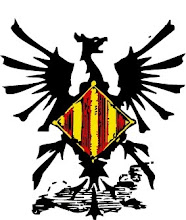Softcatala (www.softcatala.com) informs about a campaign (http://homepage.mac.com/devaleitzer/iblog/B1426745867) started by some weblogs requesting Apple to publish a Catalan version of MacOS X. According weblog Tot Mac (http://totmac.blogspot.com), Apple is prepared to make a version of its operating system, provided at least 1,000 copies of it are sold. Two years ago the possibility to translate Apple's last Operating System was debated at Macuarium (www.macuarium.com), and this reached the Catalan Parliament thanks to Francesc Ferrer, MP. In mid nineties, Apple published some Catalan versions of its Operating System, thanks to some workers in Barcelona Apple Office, the last being MacOs 8.1. On the other hand, Barcelona Apple Office closed on december 2002.
The Land of Graccus
PER UNA CATALUNYA LLIURE/ FOR A FREE CATALONIA (Atenció: per una completa visualització d'aquest bloc, us recomano que utilitzeu el navegador Mozilla Firefox)
dilluns, 12 de gener del 2004
dijous, 1 de gener del 2004
Article publicat al New York Times, el dia dels Innocents.
December 28, 2003
A Fighter for Catalan Pride Leaves a Legacy of Nationalism
By DALE FUCHS
BARCELONA, Catalonia— Jordi Pujol, the architect of this Catalonian region's brand of pragmatic nationalism, began his activist years scribbling "long live free Catalonia" on buildings, and ended up as part of the establishment, working in a medieval palace, in an office with a painting of the Virgin Mary hanging below a carved Catalonian coat of arms.
He was jailed for two years after organizing a flamboyant protest against Franco in 1960. Protesters burst onto the stage of a Barcelona concert hall and sang the Catalonian anthem, Mr. Pujol recalled, a particular rebuke to the dictator since the Catalonian language and symbols were banned from public life.
Mr. Pujol, 73, left office at the head of the regional government, or Generalitat, on Dec. 19, after 23 years, having made his version of Catalan autonomy the way of life for the 6.5 million inhabitants of this wealthy region that is considered the most pro-European part of Spain. The region boasts of having 23 percent of Spain's industrial production and of its foreign investment in industry.
"My goal was to restore the people's pride and self esteem," Mr. Pujol said during a recent interview at his office in the Barcelona palace. "After 40 years of dictatorship, we needed to believe that we could function on our own."
In six elected terms, Mr. Pujol (pronounced poo-ZHOLE) passed laws requiring the use of the regional language, Catalan — whose pronunciation is a mix of French and Spanish — on state-run television and radio, and in government offices and schools. He wrested control of law enforcement from the central government and, bypassing Madrid, forged economic cooperation agreements with neighboring French provinces.
His party, Convergence and Union, has recently floated the idea of regulating immigration to the region though embassies abroad and requiring newcomers to study Catalan.
Political opponents may have criticized his conservative economics, linguistic crusade and iron-fisted control of his party. But scholars credit him with having created a model of moderate nationalism that was copied in other parts of the country — especially in Galicia, where leaders have revived the regional identity and language without threatening Spain's territorial integrity.
Catalonia's success has also inspired Wales, Scotland and other regions seeking peaceful means of gaining greater home rule, said Sebastián Royo of the Center for European Studies at Harvard.
In Spain the tiny Basque provinces have won broad autonomy against a backdrop of radical separatist violence. But Mr. Pujol has focused on deft deal-making, his personal appeal and a welcoming attitude toward migrants from other parts of Spain, said Josep María Solé Sabaté, a historian of contemporary Spain with the Autonomous University of Barcelona.
"His slogan has always been, `Everyone who lives and works in Catalonia is Catalan,' " Mr. Solé said. That is in contrast to the Basque region, he said, where nationalist leaders have often been accused of treating other Spaniards as second-class citizens.
Mr. Pujol held power in an era of vast change, but is leaving at a moment when tensions are intensifying between the central government and nationalists in Catalonia (and the Basque region). Prime Minister José María Aznar's conservative administration says the era of power-giveaways in both regions has come to an end, and may have gone too far.
Mr. Pujol's handpicked successor lost regional elections in November to a longtime Socialist Party rival, the former Barcelona mayor Pasqual Maragall, but Catalonian nationalism was not the issue. Mr. Maragall has promised to promote a Catalonian agenda, but with a leftward slant. A minor separatist party, the Republican Left, won a strong showing in the elections and has negotiated an important role in a governing coalition with Mr. Maragall's Catalonian Socialist Party.
Mr. Aznar has called their plans to shift power further from Madrid "unconstitutional."
Yet the impetus in the Catalan and Basque regions for further autonomy grows. The Basque regional government has announced a plan to turn its tiny northern region into a "freely associated state" within Spain, a decision that Madrid is trying to block in court. And there has been considerable local criticism of a plan by Spain's education minister to require schools to devote more class time to Castilian Spanish, at the expense of Catalan, the official teaching language.
Mr. Pujol, who speaks six languages, does not define himself as a Spaniard but as a European and says he models himself after French and German pioneers of a united Europe, "the great rebuilders of their countries, destroyed by war."
In the European Union, he has lobbied for more representation of "nations without states," as he calls regions like Catalonia or Wales. "More people speak Catalan than Slovak or Norwegian, but being we don't have our own state," he said. Now, with power flowing to Brussels, "we can't let our guard down."









